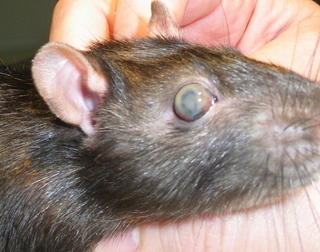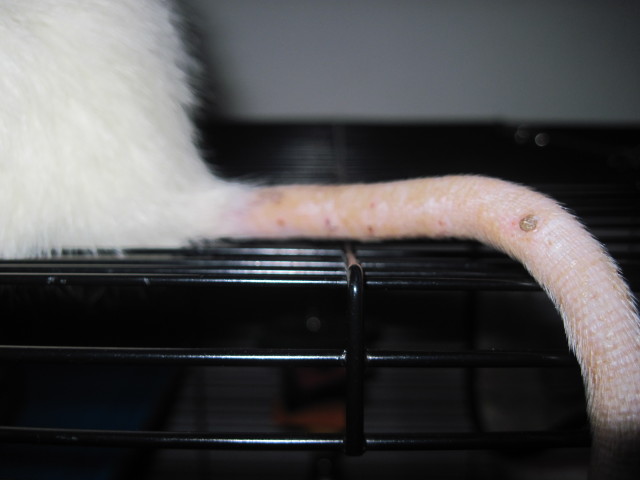QuestionHi,
I have 2 male rats, one named Dobbie, and one named Buster. Both are very loving and love to be cudded. I handle them everyday, so they are used to being with me. My question is how often should they actually be urinating? I don't think that it is peeing out of fear but, it is a puddle, not just enough to mark me and go on. How often should I let them take a break while I am holding them to go do their business?
Also my friend has 2 female rat and it wanting to breed her...how old do my boys need to be before I take them to visit her girls?
Thanks for all your help,
Regina
AnswerIt seems to me that your boys are going to the bathroom as normally as possible. If you wanted you could try potty training them to use a litter box, it might take a while but most rats do very well with the training. Just get a small litter pan for inside their cage. Put a different type of bedding in the pan than you use in the bottom of the cage (never use kittie litter though, it's very dusty and bad for their respiratory systems). Everytime you see a poo in the bottom of the cage, place it in the litter box, do this a few times a day, and keep putting them in the litter box. The rats will realize that their poos belong in that box and will start to use it to do their business (poo and pee). Another good tip is to place the litter pan wherever you find the most amount of build up of urine or feces, as this is where they commonly use the bathroom anyway. Once they are trained you can bring the box out with you during playtime.
As far as breeding goes, It's very hard for me to give you advice in this area because I do not agree with it. Breeding is very complicated and can produce a huge array of issues in the parents and the babies. Are these rats pet shop rats or pedigreed rats from a breeder? I ask because there are most times, a huge difference. Established good breeders tend to breed for the improvement of the species. To better the rat as a whole and for no other reason. By whole I mean, improve their color, types, personality, temperament, healthy, and longevity. By selectively breeding the healthiest sweetest rats, you end up with even healthier, sweeter babies. Since breeders keep extensive records of their rats health and personalities, they know exactly what they are breeding. The issue with rescue or pet shop rats is that you do not know their background or what their parents might carry genetically as far as diseases go. Rats are prone to tumors and cancer and it's extremely unlikely that a pet shop has bred their rats away from those traits. So imagine you having a male and female rat that in the future will both develop cancerous tumors, that means if you breed them together- theres an extremely high chance that the same issue will come up in their babies and there is no telling what age they could show up. Tumor removal surgeries are very expensive and you can't leave tumors untreated.
Another possibility is megacolon. This is a genetic disease resulting from the inability to pass fecal matter through the bowels. It results in a distended colon and is very painful and deadly. This happens shortly after the babies start eating solid foods around 2 weeks but has been known to show up later around 3 to 4 weeks as well. Euthanasia is always needed as the amount of suffering these babies will go through by letting the disease run it's course is intense and in my opinion letting it run it's course is inhumane.
Complications during birth could also arise, the female could have an obstruction of the birth canal which would cause all the babies to die and could also result in the death of the mother. This is not uncommon and does happen. If the mother is having obvious complications she needs to be rushed to the vet for an emergency c-section. These are very difficult on both the babies and the mother and the survival rate is low.
The difference between a breeder breeding their rats and two people who own rats and want babies are the goals, experience, and know-how. It takes allot of knowledge in genetics to get breeding right as well as it takes a lot of experience in owning rats. You also have to take in to account that breeders have a history on their rats health and know before they go in to it that no illnesses will come up in the litter. It's risky for your rats and you, to breed a litter without experience, a history, or a pedigree... I do not recommend it.
Now, I am going to answer your question, but my answering this does not in any way say that I am condoning your breeding your rats. But for the safety of the rats involved in case you do decide to go through with it- I will tell you...
The ideal age to breed a female is between the ages of 6 months and 8 months. Breeding her sooner than that is dangerous and can result in her death. NEVER breed a female after 18 months for the first time and I recommend not breeding after 12 months for sure. Breeding older then 12 months or younger than 6 months and you are raising the chance of complications significantly.
Generally it is recommended to breed a male after a year or two of age because by then you will be able to better tell their personality, health, and temperament. Never breed a rat that has shown signs of illness, cancer, tumors, or aggression or you will get that in your babies since those traits are genetically passed in their DNA. Otherwise, males can be bred after 6 months, generally by this time they have gone through puberty and shown their true colors when it comes to their personality. If they start showing signs of aggression towards you or other rats after 6 months, DO NOT BREED THEM. Because again, this can be passed on genetically.
Please take my advice to heart, I would not be telling you these things if they weren't very very real. I am a breeder myself but have many years of experience under my belt and know the history on my rats when it comes to their health. Also I have an amazing vet. Please be sure to have a vet that works with rats and can help you in the event of an emergency.
I hope I was able to help and that you were not offended by my response but I don't' beat around the bush and always like to choose the most honest answer I have, and this was it... Good luck.

 Half swollen face and eye looks like it could pop out.
QuestionQUESTION: My rat, Sage, has always been very sn
Half swollen face and eye looks like it could pop out.
QuestionQUESTION: My rat, Sage, has always been very sn
 Inner Ears, Bulging Eyes, Blindness?
QuestionQUESTION: Well hello; yet again. I have a femal
Inner Ears, Bulging Eyes, Blindness?
QuestionQUESTION: Well hello; yet again. I have a femal
 now not drinking or eating at all
Question
QUESTION: hi Sandy
I have a ratty quest
now not drinking or eating at all
Question
QUESTION: hi Sandy
I have a ratty quest
 Mole or Tumor?
Question
Rat
I have two male rats that are around a yea
Mole or Tumor?
Question
Rat
I have two male rats that are around a yea
 My rat has a lump
Question
Silks lump Silks lump again
I hav
My rat has a lump
Question
Silks lump Silks lump again
I hav